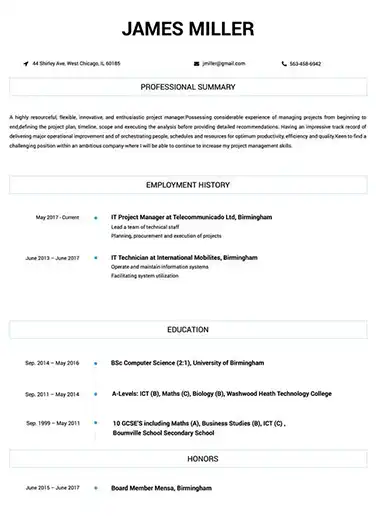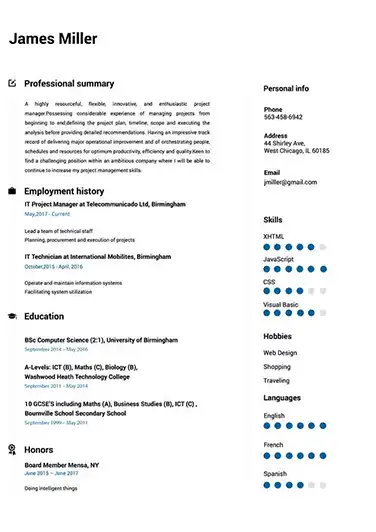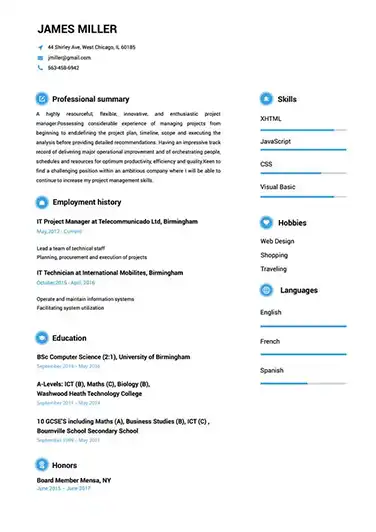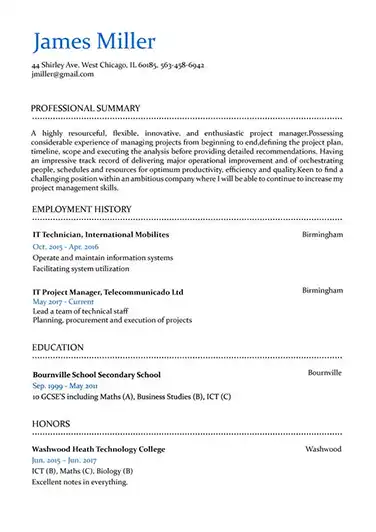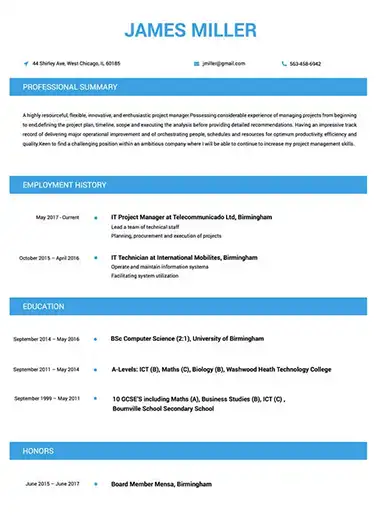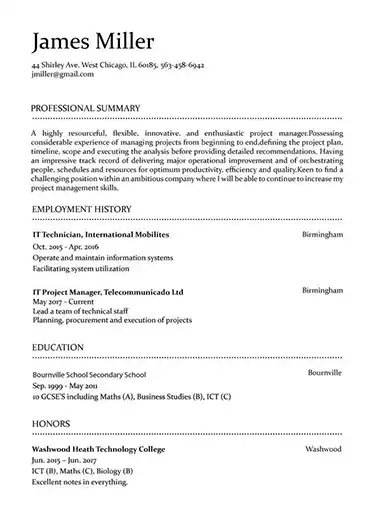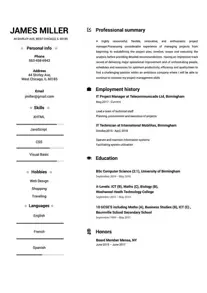 Use This Template
Use This Template
Build your resume in 15 minutes
Create an awesome resume that meets the expectations of potential employers with our selection of professional, field-tested resume templates.
police officer: Resume Samples & Writing Guide
edwilson@gmail.com
691-373-4130
Employment history
- Participate in community outreach programs
- Make arrests
- Monitor security systems
- Provide first aid
- Make arrests
- Patrol assigned areas
- Write reports
- Interact with the public
- Participate in community outreach programs
Education
Skills
Do you already have a resume? Use our PDF converter and edit your resume.
leonardingram@mail.com
689-112-3657
Employment history
- Write reports
- Conduct searches
- Patrol assigned areas
- Testify in court
- Operate specialized law enforcement equipment
- Respond to emergency calls
- Provide first aid
- Monitor security systems
- Interact with the public
Education
Skills
sam.nelson@inbox.com
743-836-3392
Professional Summary
Employment history
- Respond to emergency calls
- Testify in court
- Conduct searches
- Testify in court
- Conduct searches
- Make arrests
- Operate specialized law enforcement equipment
- Conduct searches
- Provide first aid
Education
Skills
larrynelson@inbox.com
824-740-6403
Employment history
- Provide security at public events
- Respond to emergency calls
- Interact with the public
Education
Skills
greennate67@zoho.com
764-957-7195
Professional Summary
Employment history
- Provide first aid
- Provide security at public events
- Patrol assigned areas
- Operate specialized law enforcement equipment
- Respond to emergency calls
- Provide security at public events
- Write reports
- Conduct searches
- Provide first aid
Education
Skills
Not in love with this template? Browse our full library of resume templates
“Protect and Serve” is the guiding mission that all police officers must continuously abide by in their line of work. It embodies the fundamental role these law enforcement officials play in our society: To protect the people and serve the public.
In order to do so, police officers are responsible for a range of important tasks that support the smooth functioning of society including: enforcing the law, investigating possible criminal activity, responding to emergency situations, and arresting suspected criminals.
It’s, no doubt, a challenging job to do - let alone get in the first place. The Bureau of Labor Statistics projects that from 2018 to 2028, employment of police and detectives is projected to grow 5 percent, which is the same percentage growth as the average for all occupations. Notably, they also state that, “Job applicants may face competition because of relatively low rates of turnover.”
With only moderate growth, low rates of turnover, and high competition, it is crucial that you make each job application as strong as possible. The only way to do this is to create a captivating police resume that ticks all the right boxes for recruiters.
If your current resume for police officer positions keeps getting rejected or you’re getting ready to apply for new jobs, this comprehensive, but straightforward resume writing guide is a must-read. We’ll equip you with the insider knowledge you need to piece together a police officer resume that will land you the next job.
This guide will cover a variety of important topics including:
- The best format for a police officer resume
- Which sections your resume needs to include and how to write them
- How to select which achievements and skills to feature
- Expert tips on how to make your resume stand out
1. Multiple Template Examples
2. How to Write a Police Officer Resume That Tells a Compelling Story
How should you format your resume?
Ensuring that the contents of your resume is well-written, relevant, and engaging will get you halfway to making a stunning police office resume. To get the whole way there, you also need to choose the most effective format to make your accomplishments shine.
In line with other resume experts, we recommend that police officers use a reverse-chronological format.
This format is revered for helping focus attention on your most relevant accomplishments, as it introduces your most recent work experience first. This is notable, because it aligns with recruiters’ expectations to see your current or very last job at the very top of your resume (and not the first job you had back in 2007!).
Another crucial consideration that you will need to keep in mind when creating your resume is to make stylistic elements, such as your resume’s font, margins, and line spacing, just right. Below, we’ve shared standard layout guidelines that we advise you to follow to the letter:
- Number of Pages: You should only submit one page resumes.
- Fonts to Use: Select a font that recruiters will be familiar with, such as Arial or Times New Roman.
- Fonts to Avoid: Don’t use a font that will distract the recruiter from reading the contents of your resume, such as Alex Brush or Mistral.
- Margins: 1 inch on all sides.
- Line Spacing: 1 or 1.15.
- Header size: 14-16 point size.
- Text size: 11-12 point size.
Pro tip: Unless you’re specifically asked to send your resume as a Microsoft Word file, we strongly recommend that you send it as a PDF file. A PDF file will retain all of the stylistic elements you originally had in your resume, no matter who you send it to.
In contrast, the stylistic elements in an MS Word file can easily shift around depending on which version of MS Word the receiver opens it in. Moreover, some elements may appear to be missing to the recruiter if you imported them from a source outside of MS Word. For example, a recruiter may not be able to see any text written in a font you downloaded from a third party, unless their version of MS Word also has that font.
What are the most important sections to include in your resume?
Your resume is made up of a number of sections that work together to sell your best attributes as a police officer. The most important sections you should include in your resume are:
- Personal Information: At the very top of your resume, state your name and contact information including your home address, email address, and phone number.
- Resume Objective or Resume Summary: A 2-3 sentence overview about your career goals or why you are an ideal candidate for the job.
- Experience (Achievements) Section: An overview of your most relevant and impressive work experiences across various positions.
- Education Section: Details of your educational background.
- Skills Section: A list of 6-8 of the most relevant skills you can offer.
- Training and certifications: A list of the most relevant training and certifications you have to your name.
How can you give recruiters what they’re looking for?
As you’re writing your resume, there’s one type of person you should constantly keep in mind. Yes - we’re talking about recruiters. Your resume should be tailored to address the specific criteria they’re looking for from their perfect candidate.
So what are recruiters looking for? Recruiters for police officer positions want to hire police officers who have shown an unwavering commitment to their duties as well as to their own professional growth. After all, being an upstanding police officer requires a combination of useful skills, relevant training, and proven experience in law enforcement. It also requires passion for the job and a strong sense of ethical conduct.
You can give recruiters what they’re looking for by using your resume as a vehicle to communicate that you offer all of these attributes and more. Don’t assume that a recruiter will know what you do as a police officer - you need to provide enough details, so they can paint a clear picture.
Think of your resume as a chance to form a connection with someone who has the means to get you the job you want. Your one job is to convince them, via your resume, that you aren’t just like every other police man or woman out there; in actual fact, you offer the precise skills, training, and experience they’re after and then some.
How to list additional training and certifications as a police officer
Listing relevant training and certifications you have undergone as a police officer on your resume is non-negotiable. They can show that you have the proper qualifications to be in the police force in the first place and that you take your career progression seriously.
When it comes time to adding your training and certifications to your resume, don’t write about them in proper sentence form like this candidate did:
Completed a Crime Scene Crime Scene Technician program at the Georgia Public Safety Training Center (GPSTC) which taught me a lot about how to properly accurately collect evidence and present my findings.
If the recruiter wants to learn more about your training and certifications, they will ask you in the interview stage. On your resume, you should only note the most important details about each one in a section called “Training and Certifications”, as the following example shows:
Training and Certifications
Crime Scene Crime Scene Technician training, Georgia Public Safety Training Center (GPSTC), GA, 2018
Here’s a simple format that you can use to list each one:
[Name of the training or certification], [Name of the institution (if relevant)], [The state it was completed in], [Year completed]
So what type of training and certifications should you even include in your Training and Certifications section? Let’s start with the most important one: your police academy training. As you’ll be well aware, every police officer needs to graduate from a policy academy in order to work as an officer. If you’ve already been in the police force for many years, it may seem redundant to include the fact that you’re a fully trained police officer in your resume.
However, as this is a mandatory requirement for all police officer jobs, you need to make your training crystal clear in your resume. It is also important to do so in order to pass ATS. Police departments may utilize a special kind of HR software called ATS in order to save time during the hiring process. ATS works by fielding applicants based on certain requirements and keywords. If a police department has specified that their ATS must detect the words “police academy” in resumes in order to pass them, your resume will be instantly rejected when it doesn’t include them.
In addition to police academy training, you may have enrolled in additional training and certifications. For example:
- Crime scene technician training/certification
- Arson investigator training/certification
- Traffic Accident Reconstruction Specialist training/certification
- Crime & Intelligence Analyst training/certification
Be sure to include the most relevant ones to the job you’re applying for by using the format we shared above.
Pro tip: To really draw attention to one type of training or certification you’re especially proud of, highlight it in your resume objective or resume summary.
Which skills should you mention on a resume?
Police officers need to draw on innumerable skills in the course of their career - let alone in a single day! So we don’t blame you for thinking that it would be preferable to mention as many skills as possible on your resume.
However, a resume is only meant to serve as a snapshot of your entire skill set. After all, you only have one page to work within, so it’s not practical to include them all.
For this reason, you should focus on the skills that a recruiter is specifically searching for, when selecting their ideal candidate.
So how on earth do you figure out what these skills are? Take a careful look at the job ad. You will see that it’s jam-packed with references to which skills are highly-valued by the recruiter. Try to categorize them into two types of skills:
Hard skills
Describes technical, profession-specific skills. For example:
- Investigating crimes
- Taking fingerprints
- Tracking down leads
- Questioning suspects
- Enforcing traffic laws
- Efficiently resolving disputes
- Creating crime-reducing programs
- Supervising squads
- Preventing antisocial behavior
- Giving evidence in court
Soft skills
Describes interpersonal, communications, and emotion-focused skills. For example:
- Negotiation skills
- Assertiveness
- Problem solving skills
- Communication skills
- Teamwork skills
- Maturity
- Resilience
- Time management
- Meticulousness
- Ability to remain calm in challenging circumstances
After you’ve made a list of the hard and soft skills in a job ad, you’ll be able to work out which of them you can most confidently offer. Try to choose a balance of both types of skills. Then, it’s time to incorporate them throughout your resume as seamlessly as possible. We recommend that you include your skills in the following sections:
- “Skills” section: Include around 6 to 8 skills listed one after the other.
- Resume objective or resume summary: Mention one or two.
- Work experiences section: Try to include one skill per achievement.
How to highlight your most important achievements
Every police officer has a number of moments throughout their career that they’re particularly proud of. It’s always a good reminder that your job is well worth the gruelling hours and stress when you reflect on them.
However, it’s not necessarily these types of achievements that you should highlight in your resume. While they may mean a lot to you, they may not leave the same impression on a recruiter.
The achievements you should be focusing on in your resume need to be the same ones a recruiter is looking for. You can discover which achievements will impress them by analyzing the job ad for clues. You can use the same method we described above in the skills section.
There is a certain art to effectively highlighting your achievements on your resume. You need to not only make it clear to the recruiter what your achievement was, but also the significance of it. That is, you must clearly highlight the positive effect your achievement had on your department, the police force in general, the community - or all three!
This means your achievement should not look completely uninspiring like this one does:
- Led a long investigation that had a positive impact on the community.
Instead, it should be written in a way that makes it clear to the recruiter how noteworthy it is. We’ve rewritten the above achievement to show the difference that careful wording can make:
- Led an extensive 8 month investigation that resulted in the seizure of $3 million dollars worth of methamphetamines that were planned for sale to local youths.
As you can see for yourself, the rewritten achievement is far more effective in capturing a recruiter’s attention, because it provides specific, eye-catching, and relevant details. It also quantifies the achievement by using numbers and a tangible example that explains the result their achievement led to.
How to write a resume objective or summary that hooks recruiters
Resume objectives and resume summaries are often classed as optional sections to include in your police officer resume. Some resume experts even advise applicants to exclude them altogether.
We believe that including one or the other is essential as they give a recruiter yet another reason to pay attention to your resume. Both are designed to help them determine whether you’re the police officer they’ve been looking for all along by providing a useful overview of your career goals and/or professional background.
So which one should you include?
Resume objective
A resume objective should be used by entry-level candidates with little or no experience. You should aim to show a recruiter that you’re an asset to the police force even without much experience and fit all that into 2-4 sentences. You can do this by explaining your motivations for entering the police force or continuing to serve in it. You should emphasize what experience, training, or certifications you have (if any), as well as the relevant skills you can offer.
If you are applying for an internship, be sure to state the name of the internship, as well as your GPA and any other relevant information about your studies.
Now for some resume objective dos and don’ts:
Don’t emphasize what you’re lacking or try to gain sympathy from the recruiter, like this candidate:
- I have wanted to be a police officer since I was a young kid. I don’t have any experience because I have had to juggle many responsibilities. I just need a chance to get my start.
But do remain positive and put your best foot forward, like these candidates have done:
- Second year Bachelor of Criminal Justice student at Washburn University (GPA 3.5) who wishes to apply to the esteemed Chicago Police Department’s Student Worker Program. I bring my passion for the criminal justice system and my strong knowledge of criminology and police administration to each task.
- New graduate of the Illinois State Police Academy training program is seeking to join the Batavia Police Department. I aim to utilize the drug identification and toxicology skills, as well as the analytical and interpretative skills I developed during my Master’s of Science in Forensic Science from the University of Illinois. Graduated top of my class.
Resume summary
In contrast, a resume summary should be used by police officers with two or more years in the police force. You should aim to show a recruiter that you are the right person for the job within 2 to 4 sentences. To do this, put a spotlight on your attributes that best reflect what the recruiter is looking for. You can mention your relevant soft and hard skills, experiences, and training. Here are some examples of well-written resume summaries:
- Community-focused police officer with 5 years of experience working for the California Department of Motor Vehicles Investigations Division. Aspiring to transfer to the Arizona Division of the Department, where I can offer my sharp investigative skills and strong interpersonal skills.
- Resilient police officer in the Maryland State Police Department for 9 years who specializes in crime scene investigation. Endeavoring to fulfill the police corporal position within the Department. Completed the Federal Law Enforcement Training Centers (FLETC)'s Law Enforcement Supervisors Leadership Training Program in 2020.
How to write a police officer resume when you have limited (or no) experience?
Working your way up in the police force with limited experience or getting your first job as a police officer can both be challenging. After all, it’s a profession that values experience, but at the same time is difficult to get your foot in the door.
So what are you meant to do if you’ve always dreamed of becoming a police officer? You need to work on your resume so that each section sells the most enticing and relevant attributes you plan to bring to the police force. Here are some tips that will have recruiters rushing to contact you:
- Don’t emphasize your inexperience: A common mistake entry level candidates make is directly referencing their inexperience. For example, they write something like, “Aspiring police officer with no experience…” in their resume objective. A recruiter will already be able to see just how much (or little!) experience you have, so there’s no need to rehash that fact. Focus on your positives rather than your negatives.
- Use a functional resume format: One smart way to divert attention away from your lack of experience is to focus on your skills instead. A functional resume format will help you do this, as it presents your skills over your experience in your resume. Remember to match your skills to what a recruiter is looking for as much as possible!
- Be sure to include relevant internships or focus on the most relevant parts of your internships: Ideally, you’ll be able to include an internship that has some connection to law enforcement. But don’t fret if you don’t have one to your name! You can also be strategic about how you represent your internship experiences. Shine a light on the responsibilities and skills police officers also engage in. For example, staying calm under pressure, report writing, and communicating clearly with others.
- Set yourself up for success: Contrary to what many people think, you can’t “just become” a police officer. There are, in fact, a number of requirements you need to fulfill in order to enter the police force. You need to be fully aware of what these are so that you can start working towards them. It’s important to note that requirements may differ from state to state, so be sure to check what your state’s are. Generally speaking, you’ll need to:
- Be a U.S. citizen who is at least 21 years old.
- Have a high school diploma or GED certificate.
- Not be a convicted felon.
- Pass a law enforcement entrance exam.
- Graduate from a police training academy.
- Pass a physical test and background check.
Pro tip: If you aim to work in certain specialized departments, such as the FBI, you may also need to have a bachelor degree and other intensive training.
How to make your resume stand out?
As we mentioned in the very beginning of this guide, the police force is a highly-competitive industry, particularly as you rise up the ranks. There are only so many roles going at one time, so you need to put in the effort to get hired. If you want to succeed in your job search, take stock of our top tips for making your police officer resume stand out:
- Be as specific as possible: General statements on your resume, that could be written by anyone, won’t help you stand out. Be specific when talking about yourself and your experiences by avoiding generalizations. Using concrete examples will help you personalize the resume.
- Highlight it if you can speak another language: Police officers need to be able to communicate with all different types of people in the community - including those who speak English as a second language. That’s why it’s worth noting if you can speak and/or write in a non-English language. You’ll score bonus points if it’s heavily spoken in the area that particular police department you’re applying for is based in.
- Avoid waffling in your resume: Police officers are known for being straight to the point. It makes sense, given that they always have a lot to do, but not enough time to do it! This means they won’t want to waste time trying to decipher your resume. Stick to the point and avoid waffling at all costs. Remember, there’s a big difference between providing vital details about yourself and overloading your resume with unnecessary information and words. Brevity is definitely valued in police officer resumes, so don’t miss out on a job due to being too wordy!
3. How Resumebuild.com’s Resume Builder Tool Can Be Utilized for an Easy Resume Setup
If you’ve already started the process of tweaking your resume, you’ll know that it isn’t a process that takes a mere matter of minutes. Even just reading the guide above will give you a taste of just how much work is involved in making an eye-catching resume. It can take anywhere from hours to days to refine your resume.
Fortunately, there’s no need to put yourself through the pain of creating the perfect resume all by yourself. One of the best tricks of the trade that countless job applicants have taken advantage of is to use a resume builder instead.
A resume builder does exactly what it says on the tin; it builds your resume from scratch. The thing is, resume builders don’t have the best reputation because most of them make bogus claims about their quality. The resumes will not only be poorly-formatted, but also lack the essential components a recruiter is looking for.
Don’t take the risk with subpar resume builders - instead, choose one that has been designed in consultation with HR professionals, namely, Resumebuild.com’s professional resume builder. Our easy-to-use, HR-friendly resume builder has helped thousands of jobseekers land their dream job.
Instead of wasting hours trying to make your resume look just right, simply choose from one of the many stylish resume templates available. You’ll also be able to access our pre-written, editable example - simply click and add them to your new resume.
But don’t just take our word for it! Give the ResumeBuild resume builder a go for yourself. You’ll discover that it’s your secret weapon for simultaneously saving time and impressing recruiters.
police officer Job Descriptions; Explained
If you're applying for an police officer position, it's important to tailor your resume to the specific job requirements in order to differentiate yourself from other candidates. Including accurate and relevant information that directly aligns with the job description can greatly increase your chances of securing an interview with potential employers.
When crafting your resume, be sure to use action verbs and a clear, concise format to highlight your relevant skills and experience. Remember, the job description is your first opportunity to make an impression on recruiters, so pay close attention to the details and make sure you're presenting yourself in the best possible light.
police officer/investigator
- Assists with Community relations, traffic control, criminal investigations, and general crime prevention and suppression.Regular duties included patrolling assigned zones (looking for unusual or suspicious behavior and activities/persons), enforcing laws and regulations (local, state federal) as well as departmental policies and procedures, responding to emergency and non-emergency calls for service, investigating cases and conducting follow up work on open cases, conducting interviews with victims and suspects, completing reports as well as other necessary paperwork, various traffic enforcement which includes investigating traffic accidents and DUI incidents, crime scene investigation, evidence gathering, collecting witness statements, conducting arrests, assisting in court room procedures and administering first aid when necessary.
- Collateral duties include, assisting the CID units with investigations through criminal analysis and research.
- Advanced training in crisis intervention as well as being a member of the Crisis Negotiation Team.
- Performed impromptu inspections of public establishments to ensure adherence to rules and regulations
police officer
- Actively patrol city streets.
- Respond to non-emergent and emergent calls.
- Identify, preserve, collect and log evidence.
- Interact with citizens in a friendly and professional manner.
- Provide first aid.
- Perform security checks on businesses and residences.
- Direct traffic during special events, traffic crashes and other road obstructions.
police officer
- Enforce the laws of North Carolina.
- Enforce town ordinances.
- Organize and implement community projects.
- Maintain the firearms/ammo budget.
- Train new officers.
- Provide annual reviews to employees on A platoon.
- Public speaking on various topics per the groups request.
police officer, detective, & shift supervisor
- Performed difficult staffing duties, including dealing with under-staffing, refereeing disputes, and administering disciplinary procedures
- Planned and conducted new employee orientation to foster positive attitude toward organizational objectives
- Planned, directed, supervised, and coordinated work activities of subordinates and staff
- Maintained records and compiled statistical reports concerning personnel-related data such as performance appraisals and absenteeism rates
- Planning and initiation of special operations
- Investigated all crimes against children
- Presented the DARE program in all public and parochial schools within the city
police officer
- Provide public safety by maintaining order
- Patrol specific area(s), respond to calls for service
- Gather pertinent information, enter into department database for incident reports and records
- Follow department procedures and guidelines
police officer/investigator Job Skills
For an police officer/investigator position, your job skills are a key factor in demonstrating your value to the company and showing recruiters that you're the ight fit for the role. It's important to be specific when highlighting your skills and ensure that they are directly aligned with the job requirements, as this can greatly improve your chances of being hired. By showcasing your relevant skills and experience, you can make a compelling case for why you're the best candidate for the job.
How to include technical skills in your resume:
Technical skills are a set of specialized abilities and knowledge required to perform a particular job
effectively. Some examples of technical skills are data analysis, project management, software proficiency,
and programming languages, to name a few.
Add the technical skills that will get hired in your career
field with our simple-to-use resume builder. Select your desired resume template, once you reach the skills
section of the builder, manually write in the skill or simply click on "Add more skills". This will
automatically generate the best skills for your career field, choose your skill level, and hit "Save &
Next."
- Firearms
- Surveillance
- Patrolling
- Arrest Procedures
- Self-Defense
- Physical Fitness
- Emergency Response
- Law Enforcement
- Evidence Collection
- Investigations
- Report Writing
- Tactical Operations
- Defensive Tactics
- Security Protocols
- First Aid
- Crisis Management
- Physical Restraint
- De-Escalation
- Public Safety
- Conflict Management.
How to include soft skills in your resume:
Soft skills are non-technical skills that relate to how you work and that can be used in any job. Including
soft skills such as time management, creative thinking, teamwork, and conflict resolution demonstrate your
problem-solving abilities and show that you navigate challenges and changes in the workplace
efficiently.
Add competitive soft skills to make your resume stand-out to recruiters! Simply select
your preferred resume template in the skills section, enter the skills manually or use the "Add more skills"
option. Our resume builder will generate the most relevant soft skills for your career path. Choose your
proficiency level for each skill, and then click "Save & Next" to proceed to the next section.
- Communication
- Interpersonal
- Leadership
- Time Management
- Problem Solving
- Decision Making
- Critical Thinking
- Creativity
- Adaptability
- Teamwork
- Organization
- Planning
- Public Speaking
- Negotiation
- Conflict Resolution
- Research
- Analytical
- Attention to Detail
- Self-Motivation
- Stress Management
- Collaboration
- Coaching
- Mentoring
- Listening
- Networking
- Strategic Thinking
- Negotiation
- Emotional Intelligence
- Adaptability
- Flexibility
- Reliability
- Professionalism
- Computer Literacy
- Technical
- Data Analysis
- Project Management
- Customer Service
- Presentation
- Written Communication
- Social Media
- Troubleshooting
- Quality Assurance
- Collaboration
- Supervisory
- Risk Management
- Database Management
- Training
- Innovation
- Documentation
- Accounting
- Financial Management
- Visualization
- Reporting
- Business Acumen
- Process Improvement
- Documentation
- Relationship Management.
How to Improve Your police officer/investigator Resume
Navigating resume pitfalls can mean the difference between landing an interview or not. Missing job descriptions or unexplained work history gaps can cause recruiters to hesitate. Let's not even talk about the impact of bad grammar, and forgetting your contact info could leave your potential employer hanging. Aim to be comprehensive, concise, and accurate.
yvettethompson@icloud.com
829-003-4844
Employment history
- Provide security at public events
- Conduct searches
- Make arrests
- Enforce laws and ordinances
- Investigate suspicious activities
- Maintain public order
Education
Skills
Unexplained Year Gaps and Missing Job Experiences are a No-no
Gaps in your resume can prevent recruiters from hiring you if you don't explain them.
Key Insights- It's okay to have gaps in your work experience but always offer a valid explanation instead of just hiding it.
- Use the gap to talk about positive attributes or additional skills you've learned.
- Be honest and straightforward about the gap and explain it using a professional summary.
How to Optimize Your police officer/investigator Resume
Keep an eye out for these resume traps. Neglecting to detail your job roles or explain gaps in your career can lead to unnecessary doubts. Grammar blunders can reflect negatively on you, and without contact information, how can employers reach you? Be meticulous and complete.
Employment history
- Maintane public orderr.
- respond to emergeny call's.
- Conduct searchs
Education
Skills
Avoid Spelling Mistakes and Include your Contact Information
Missing contact information prevents recruiters from understanding you're the best fit for the position.
Key Insights- Make sure you're not missing contact information on your resume. That should include your full name, telephone number and email address.
- Make sure to use a professional email address as part of your contact information.
- Highlight your contact information and double check that everything is accurate to help recruiters get in touch with you.
police officer/investigator Cover Letter Example
A cover letter can be a valuable addition to your job application when applying for an police officer/investigator position. Cover letters provide a concise summary of your qualifications, skills, and experience, also it also gives you an opportunity to explain why you're the best fit for the job. Crafting a cover letter that showcases your relevant experience and enthusiasm for the Accounts Payable role can significantly improve your chances of securing an interview.
Wilson edwilson@gmail.com
691-373-4130
524 Cedarwood Drive, Wilmerding, PA
15148
General Dynamics
Falls Church, Virginia
Dear Hiring Committee
I am a passionate Police Officer with 7 years of experience in Law Enforcement & Military & Security. I am excited to submit my application for the Lead Police Officer position at General Dynamics, where I believe my skills and expertise would be a great asset to your team.
As someone who has faced challenges in various areas of my life and has overcome them, I am confident in my ability to adapt and thrive in any environment. I have developed a reputation for being a collaborative team player and an effective problem solver, which has been instrumental in my career's success. With my experience and passion for Law Enforcement & Military & Security, I am excited to apply my skills to this role and contribute to your organization's growth and success.
Thank you for considering my application for the Lead Police Officer role. I am looking forward to a future where we work together to drive this organization's success.
Kindest regards,
Ed Wilson
691-373-4130
edwilson@gmail.com
Ed Wilson
Showcase your most significant accomplishments and qualifications with this cover
letter.
Personalize this cover letter in just few minutes with our user-friendly tool!
Related Resumes & Cover Letters

Build your Resume in 15 minutes
Create an awesome resume that meets the expectations of potential employers with our selection of professional, field-tested resume templates.

